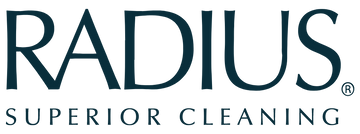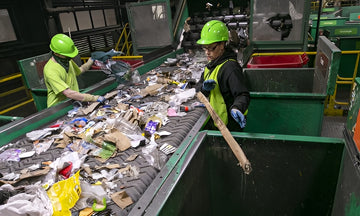Earth Day at 50: Berks County companies look for sustainable plastic, real recycling
By Lisa Scheid lscheid@readingeagle.com @LisaScheid on Twitter
Radius Inc. in Kutztown goes through 60,000 pounds of plastic annually to make its popular environmentally friendly toothbrushes.
How can a company that markets itself as environmentally friendly use plastic?
Radius President and CEO Saskia Foley would tell you not all plastic is created equal.
"We use various different types of plastics depending on the product," said Foley. "It varies from plant-based plastics that are derived from renewable timber to polypropylene plastic. All are recyclable. It depends on the type of product we’re making and what type of plastic is needed for that product.
Plastics have been made since before the first Earth Day in 1970 but in the last decade new research and innovations have focused consumers on the challenges presented by the man-made polymers that persist.
In the 50 years since that first Earth Day, which born from environmental concerns running for decades in a nation that some feared was running amok with pollution, great strides have been made to care for the environment but advocates s say more could be done.
The term "green" has become embedded in the American lexicon. Part of society can't get "green" enough while another part says enough is enough.
The Reading Eagle's weeklong series on Earth Day begins today, starting companies trying to make the most of what we discard.
'An anachronism'
According to Andrew Schoenly, Radius director of operations, the company has several specialty vendors from across the U.S. that supply the recycled plastics and bioplastics for its toothbrushes.
"We use about 60,000 pounds of cellulose propionate, TPE (thermoplastic elastomers), and natural material filled polypropylene," Schoenly said.
Foley said the company is in the final stages of moving from polypropylene material to a green polyethylene material derived from sugar cane. The move would make almost 100% of its products natural or plant-based.
As consumers have begun to seek alternatives to plastic, manufacturers and recyclers such as Radius, Carbonlite and J.P. Mascaro are innovating.
But, it's not easy.
Radius is among the companies leading the move away from oil-based plastic.
Studies have found that certain chemicals in plastic can leach into our food and beverages.
Some of these chemicals have been linked to health problems such as metabolic disorders and reduced fertility. Most problematic, according to reports from Harvard Medical School, are phthalates and bisphenol A (BPA). Both are endocrine disruptors, which are substances that interfere with the actions of human hormones.
The other problem is waste.
An Arizona professor estimates that just 1% of those chemcals makes it out of the waste stream.
The problem is that they were not designed to be recycled, said Rolf Halden, professor and director of Biodesign Center for Environmental Health Engineering at Arizona State University.
"Today’s plastics are an anachronism," Halden writes in his forthcoming book "Environment." "Many were discovered by happenstance, and they were never designed for mass production and recycling. In other words, plastics are an ongoing accident causing damage of global proportions. Their impacts on human health are multifaceted and are still emerging."
For companies like Radius, choosing plant-based plastics is a step forward but presents logistics and manufacturing challenges.
"Often times we see supply issues due to various conditions in the market with natural based plastic resins," Schoenly said. "Many times these materials are not as readily available."
There isn't the same market demand as oil based plastics and weather and harvesting patterns affect production of the raw materials.
"When it comes to manufacturing, these materials can be very difficult to mold in our injection molding machines," Schoenly said. "For instance when adding recycled materials to plastic, they will react differently than just parts being made with all plastic. It makes it very difficult sometimes to control part consistency."
Foley said it's sustainability that has guided the company's choices.
"Radius has been making plant-based toothbrushes since 1982," Foley said. "We have always been dedicated to tracking technological innovations in the plastics evolution, watching, waiting and continuously innovating in search for the ultimate solution to marry our desire to produce premium, effective products that are good for the environment and leave zero footprint. We are getting closer and closer every year.
"Our mission now is to make all of our plastics biodegradable to help turn the tide on the plastic epidemic that litters our fields and clogs our oceans. We want to go above and beyond and make our products as sustainable as possible.
"At the end of the day, using specialty, sustainable plastics is an art form as much as it is a science," Foley said. "We are dedicated to perfecting it."
'Paying the price'
Halden said recycling plastics is so difficult because they were not designed with a life cycle in mind.
"It is a short-sighted blunder that plays out on the largest scale possible with humanity and the environment paying the price," Halden said. "A price and burden that are too high."
Halden and his graduate students have documented the persistence of miniscule particles of plastic in the environment.
"These materials are not being degraded in the environment because microbes have every reason to ignore them. Bacteria have little, if anything, to gain from bothering with this type of polymeric chemistry … If the final products are conventional first-generation plastics, such as polycarbonate and PVC, they will still be persistent and polluting," he wrote.
Of recycling myths
Halden contends that plastic recycling is a myth that has helped delay meaningful changes to prevent and control plastic pollution.
"Most recycling really is just downcycling, always arriving at a material of lesser value," Halden writes in his book. "An example is the downcycling of plastic water bottles to create plastic park benches. Downcycling also implies that the amount of material needed to make the initial high-value product never gets reduced. This is not a long-term workable solution. And much of what we dutifully place in the recycling bin and what is shuttled to recycling centers across the nation still is not being subjected to recycling — or even to downcycling."
Halden said as few as 1 in 4 plastic water bottles arriving at U.S. recycling centers actually is recycled or downcycled.
"The others are incinerated, landfilled, or shipped overseas to countries that still, at least for now, accept our ever-increasing amount of plastic waste," he wrote.
CarbonLITE specializes in processing used bottles into bottle-grade PET pellets that can then be used to manufacture new beverage bottles and other products.
'Greenwashing'
The plastics numeric system exists for this exact reason (1-7), he said. Within each category lies an entirely separate chemical makeup.
"For example No. 1, PET," Farahnik said. "This material is highly recyclable and CarbonLITE is living proof. We reprocess 7 billion of these containers a year to be remade anew, back to original form. Unfortunately the same cannot be said about the 3-7s and therein lies the issue of generalizing plastic when in actuality plastic is a broad term for many substrates."
The challenge to recycling is low rates of PET reclamation nationwide, he said. Polyethylene terephthalate is the most common thermoplastic polymer resin of the polyester family.
"This would be greatly boosted if more states implemented deposit systems or EPR (extended producer responsibility), or if it was done on a federal level across the entire country," Farahnik said.
He said it is also a challenge to maintain the quality and integrity of Carbonlite's finished products.
"We must meet very stringent requirements for our customers in the beverage space," Farahnik said. "The experience and knowledge of everyone in our organization, from our line operators to team leaders is the only way we are able to address these challenges."
The role for manufacturers is to consider and design products with end-of-life in mind. Less materials, less packaging, higher rates of post-consumer content, he said.
A lot of “greenwashing” occurs on the consumer end, Farahnik said.
"It is the role of consumers to read between the lines and understand what products are truly circular and recyclable," he said.
Farahnik pointed out that boxed water, touted as an alternative to plastic, is not as recyclable as PET. It takes a specialized process to break down the containers made of paper, bioplastic-polyethylene and aluminum.
"That product can never be remade or recycled in a circular manner," Farahnik said. "It is one example of many where consumers are misled into believing they’re doing the right thing. "
Plastic bags
A challenge for the recycling industry has been what's called "flexible plastic." That is bags, envelopes, pouches, sachets, wraps, etc., made of easily yielding materials such as film, foil, or paper sheeting that, when filled and sealed, acquires pliable shape.
It gums up recycling machines, said Frank Sau, communications director for J.P. Mascaro & Sons, which has a recycling plant in Exeter Township. The plant receives hundreds of tons recyclables annually.
Through a $5 million upgrade to its equipment, Mascaro's Total Recycle began accepting flexible plastic in Pottstown, Wyomissing and South Heidelberg Township. Birdsboro is in the process doing it as well, Sau said.
Sau said municipalities need to adopt wheeled recyclables carts with lids to to keep flexible plastic from blowing away.
The flexible plastic is made into bales that are used to make materials for decks out of mostly recycled plastic. Mascaro calls that material R-Flex.
"We're taking them out of the waste stream. We are trying to be proactive," Sau said.
Plastics: an addiction
Halden said separating materials and extracting as much value from our waste is important; that turns waste into an output and ultimately a resource.
"It took a long time to train us to engage in waste sorting," Halden said. "It’s a good skill to have and practice. Now it’s the job of policymakers and industry to give us the materials we want, those that work for their initial purpose and can be truly recycled."
Halden said incremental steps are good but we need more drastic measures, particularly for high-volume, mass-produced products and packaging.
Using renewable resources is better than using fossil fuels, Halden said, but it does not change the world's addiction to plastic.

